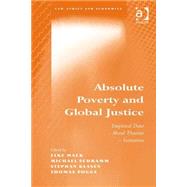Absolute Poverty and Global Justice: Empirical Data - Moral Theories - Initiatives
, by Pogge,Thomas; Mack,Elke- ISBN: 9780754678496 | 0754678490
- Cover: Hardcover
- Copyright: 10/28/2009
It is held that absolute poverty affects at least 1 billion people, leading to millions of deaths from poverty related diseases in the poorest regions of the world. The aim of this book is to develop universalizable norms aimed at tackling absolute poverty and the complex and multilayered problems associated with it. The first part of the book focuses on absolute poverty and global inequality: their levels, trends, and determinants. It is argued that much faster progress against absolute poverty is possible through reductions in national and global inequalities that produce economic growth for poor countries and households. The moral assessment of absolute poverty is at the centre of the second part. Diverse moral views imply that international agencies as well as the citizens, corporations, and governments of affluent countries bear a moral responsibility to reduce absolute poverty. The third part deals with strategies of eradication through specific policies and structural reforms. It is argued that because of its moral importance and requirement for only modest efforts and resources, the goal of overcoming absolute poverty must be given much higher political priority by international agencies and by the citizens, corporations and governments of affluent countries. It is further argued that these agents and agencies should be encouraged to facilitate and promote new initiatives. The fourth and final part discusses how these initiatives might be realized.







